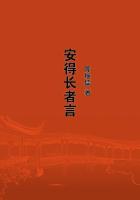A little while thereafter Pantagruel sent for Panurge and said unto him, The affection which I bear you being now inveterate and settled in my mind by a long continuance of time, prompteth me to the serious consideration of your welfare and profit; in order whereto, remark what I have thought thereon. It hath been told me that at Panzoust, near Crouly, dwelleth a very famous sibyl, who is endowed with the skill of foretelling all things to come. Take Epistemon in your company, repair towards her, and hear what she will say unto you. She is possibly, quoth Epistemon, some Canidia, Sagana, or Pythonissa, either whereof with us is vulgarly called a witch,--I being the more easily induced to give credit to the truth of this character of her, that the place of her abode is vilely stained with the abominable repute of abounding more with sorcerers and witches than ever did the plains of Thessaly. I should not, to my thinking, go thither willingly, for that it seems to me a thing unwarrantable, and altogether forbidden in the law of Moses. We are not Jews, quoth Pantagruel, nor is it a matter judiciously confessed by her, nor authentically proved by others that she is a witch. Let us for the present suspend our judgment, and defer till after your return from thence the sifting and garbling of those niceties. Do we know but that she may be an eleventh sibyl or a second Cassandra? But although she were neither, and she did not merit the name or title of any of these renowned prophetesses, what hazard, in the name of God, do you run by offering to talk and confer with her of the instant perplexity and perturbation of your thoughts? Seeing especially, and which is most of all, she is, in the estimation of those that are acquainted with her, held to know more, and to be of a deeper reach of understanding, than is either customary to the country wherein she liveth or to the *** whereof she is. What hindrance, hurt, or harm doth the laudable desire of knowledge bring to any man, were it from a sot, a pot, a fool, a stool, a winter mitten, a truckle for a pulley, the lid of a goldsmith's crucible, an oil-bottle, or old slipper? You may remember to have read, or heard at least, that Alexander the Great, immediately after his having obtained a glorious victory over the King Darius in Arbela, refused, in the presence of the splendid and illustrious courtiers that were about him, to give audience to a poor certain despicable-like fellow, who through the solicitations and mediation of some of his royal attendants was admitted humbly to beg that grace and favour of him. But sore did he repent, although in vain, a thousand and ten thousand times thereafter, the surly state which he then took upon him to the denial of so just a suit, the grant whereof would have been worth unto him the value of a brace of potent cities. He was indeed victorious in Persia, but withal so far distant from Macedonia, his hereditary kingdom, that the joy of the one did not expel the extreme grief which through occasion of the other he had inwardly conceived; for, not being able with all his power to find or invent a convenient mean and expedient how to get or come by the certainty of any news from thence, both by reason of the huge remoteness of the places from one to another, as also because of the impeditive interposition of many great rivers, the interjacent obstacle of divers wild deserts, and obstructive interjection of sundry almost inaccessible mountains,--whilst he was in this sad quandary and solicitous pensiveness, which, you may suppose, could not be of a small vexation to him, considering that it was a matter of no great difficulty to run over his whole native soil, possess his country, seize on his kingdom, install a new king in the throne, and plant thereon foreign colonies, long before he could come to have any advertisement of it: for obviating the jeopardy of so dreadful inconveniency, and putting a fit remedy thereto, a certain Sidonian merchant of a low stature but high fancy, very poor in show, and to the outward appearance of little or no account, having presented himself before him, went about to affirm and declare that he had excogitated and hit upon a ready mean and way by the which those of his territories at home should come to the certain notice of his Indian victories, and himself be perfectly informed of the state and condition of Egypt and Macedonia within less than five days. Whereupon the said Alexander, plunged into a sullen animadvertency of mind, through his rash opinion of the improbability of performing a so strange and impossible-like undertaking, dismissed the merchant without giving ear to what he had to say, and vilified him. What could it have cost him to hearken unto what the honest man had invented and contrived for his good? What detriment, annoyance, damage, or loss could he have undergone to listen to the discovery of that secret which the good fellow would have most willingly revealed unto him? Nature, I am persuaded, did not without a cause frame our ears open, putting thereto no gate at all, nor shutting them up with any manner of enclosures, as she hath done unto the tongue, the eyes, and other such out-jetting parts of the body. The cause, as I imagine, is to the end that every day and every night, and that continually, we may be ready to hear, and by a perpetual hearing apt to learn. For, of all the senses, it is the fittest for the reception of the knowledge of arts, sciences, and disciplines; and it may be that man was an angel, that is to say, a messenger sent from God, as Raphael was to Tobit. Too suddenly did he contemn, despise, and misregard him; but too long thereafter, by an untimely and too late repentance, did he do penance for it. You say very well, answered Epistemon, yet shall you never for all that induce me to believe that it can tend any way to the advantage or commodity of a man to take advice and counsel of a woman, namely, of such a woman, and the woman of such a country. Truly I have found, quoth Panurge, a great deal of good in the counsel of women, chiefly in that of the old wives amongst them; for every time I consult with them Ireadily get a stool or two extraordinary, to the great solace of my bumgut passage. They are as sleuthhounds in the infallibility of their scent, and in their sayings no less sententious than the rubrics of the law.
Therefore in my conceit it is not an improper kind of speech to call them sage or wise women. In confirmation of which opinion of mine, the customary style of my language alloweth them the denomination of presage women. The epithet of sage is due unto them because they are surpassing dexterous in the knowledge of most things. And I give them the title of presage, for that they divinely foresee and certainly foretell future contingencies and events of things to come. Sometimes I call them not maunettes, but monettes, from their wholesome monitions. Whether it be so, ask Pythagoras, Socrates, Empedocles, and our master Ortuinus. Ifurthermore praise and commend above the skies the ancient memorable institution of the pristine Germans, who ordained the responses and documents of old women to be highly extolled, most cordially reverenced, and prized at a rate in nothing inferior to the weight, test, and standard of the sanctuary. And as they were respectfully prudent in receiving of these sound advices, so by honouring and following them did they prove no less fortunate in the happy success of all their endeavours. Witness the old wife Aurinia, and the good mother Velled, in the days of Vespasian.
You need not any way doubt but that feminine old age is always fructifying in qualities sublime--I would have said sibylline. Let us go, by the help, let us go, by the virtue of God, let us go. Farewell, Friar John, Irecommend the care of my codpiece to you. Well, quoth Epistemon, I will follow you, with this protestation nevertheless, that if I happen to get a sure information, or otherwise find that she doth use any kind of charm or enchantment in her responses, it may not be imputed to me for a blame to leave you at the gate of her house, without accompanying you any further in.















